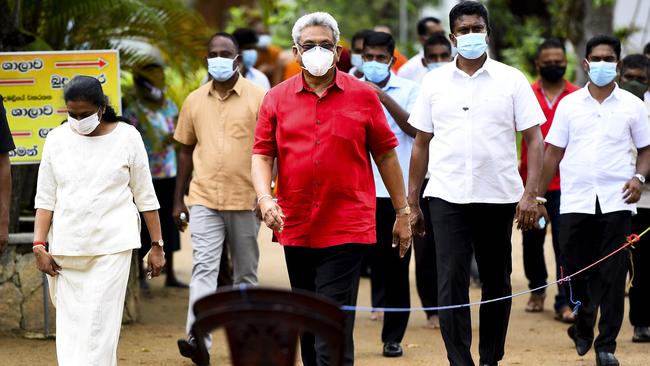Sri Lankan election to help Rajapaksa family keep grip on power
Millions of Sri Lankans braved the polls on Wednesday to elect a new parliament analysts predict will help the ruling Rajapaksa family cement its grip on power.

Millions of mask-wearing Sri Lankans braved the polls on Wednesday to elect a new parliament analysts predict will deliver the ruling Rajapaksa family the two-thirds majority it craves to roll back democratic reforms and cement its grip on power.
The election, postponed twice because of the coronavirus pandemic but eventually held with strict hygiene protocols, comes amid looming economic disaster for Sri Lanka, which the Asian Development Bank predicts will suffer an unprecedented 6.1 per cent contraction this year.
The tourism and remittance-dependent country of 22 million has suffered triple hits from last year’s Easter Sunday bombing, COVID-19 and a crippling foreign debt — largely to China and mostly accumulated under the previous Rajapaksa government which lost office in 2015.
Compounding its economic problems is a series of recent tax cuts delivered by President Gotabaya Rajapaksa, which have left a hole in government revenues.
Yet few doubt the Rajapaksas will easily win a simple parliamentary majority thanks to a deeply-divided opposition United National Party, and then secure a two-thirds majority through post-election horse-trading.
Mr Gotabaya, 71, and his brother Mahinda, 74, a former president whom he installed as caretaker Prime Minister after his November election victory, have lobbied voters hard to give their Sri Lankan Podujama Peramuna (SLPP) party the power to roll back constitutional changes made under the previous government that limit presidential powers.
“It is impossible to make any meaningful changes and implement the agenda that I presented to the people,” President Gotabaya, a feared former defence secretary in his brother’s former government, argued last week.
Many Sri Lankans supported the curbs on presidential power delivered following the 2015 election defeat of Mahinda Rajapaksa, whose government ended the decades-long Tamil Tiger insurgency but was dogged by allegations of corruption, torture, disappearances and civilian killings in the last months of the conflict.
Analysts say voters have been left with little choice this election and that the Rajapaksas will likely secure their two-thirds majority, notwithstanding their unabashed Sinhalese nationalism at the expense of the Christian, Muslim and Hindu Tamil minorities.
“The most straight-forward way would be if they get 150 out of the 225 seats in parliament, but more likely they will fall short of that and will make up the numbers by co-opting the smaller parties into joining a coalition government,” said one political commentator who asked not to be named.
“The opposition is so divided and the Rajapaksas are saying if you want stable government, national security and economic growth give us the parliamentary power in addition to presidential power.”
It is a convincing proposition for those craving stability after the last government in which a delicate political pact between the president and prime minister collapsed, leaving the two leaders on opposing political sides.
The rift is widely seen as the reason why intelligence pointing to last year’s co-ordinated Easter Sunday terrorist attacks was ignored, leading to the deaths of 279 people. Months later Gotabaya was elected President on a national security platform.
But there are fears a Rajapaksa government, unimpeded by an effective opposition, will once again degrade South Asia’s oldest democracy and cement the power of the ambitious political family for a decade or longer.
Under Gotabaya there has also been a pivot back to Beijing with major infrastructure projects underpinned by grants from the Japanese and US governments scrapped, while others supported by short-term loans from Chinese banks have been fast-tracked.
Basil Rajapaksa, a younger brother of Mahinda and Gotabaya and political adviser to their government, recently hailed the Chinese Communist Party as a model for how the SLPP should govern.
First election results are expected on Thursday night, with the final tally due on Friday.
–
All in the family: the Rajapksa dynasty
The patriarch
Mahinda Rajapaksa, 74, served as prime minister in 2004 and then president from 2005 until January 2015. He was appointed prime minister a second time by his brother Gotabaya last November. Mahinda is adored by the Sinhala-Buddhist majority for crushing separatist Tamil rebels in May 2009.
The terminator
Gotabaya Rajapaksa, 71, was Mahinda’s lieutenant during his reign, holding the influential post of secretary to the ministry of defence with responsibility for day-to-day control of the armed forces and police. Dubbed “The Terminator” by his own family, he is feared by foes for his short temper. Has faced several corruption allegations, but his court cases have been frozen or withdrawn as he enjoys immunity after winning the presidency in 2019.
Mr ten per cent
Basil Rajapaksa, 69, managed the economy under Mahinda. Was called Mr Ten Percent in reference to commissions he allegedly took from government contracts. Subsequent administrations failed to prove any charges he siphoned off millions of dollars from state coffers.
The bodyguard
Chamal Rajapaksa, 77, was speaker of the Sri Lankan parliament when Mahinda was president and is also a former minister. Formerly a police officer, he once served as a personal bodyguard to Sirimavo Bandaranaike, the world’s first woman prime minister. Is expected to continue to serve in the prime minister’s cabinet in the new government.
The scion
Namal Rajapaksa, 34, a lawyer, is the eldest son of Mahinda. Entered parliament in 2010 and during his father’s decade in power, Namal was highly influential. The former regime accused him of money laundering and other corruption charges, for which he still faces trial. Observers say Mahinda is grooming him to become a future president.
AFP




To join the conversation, please log in. Don't have an account? Register
Join the conversation, you are commenting as Logout